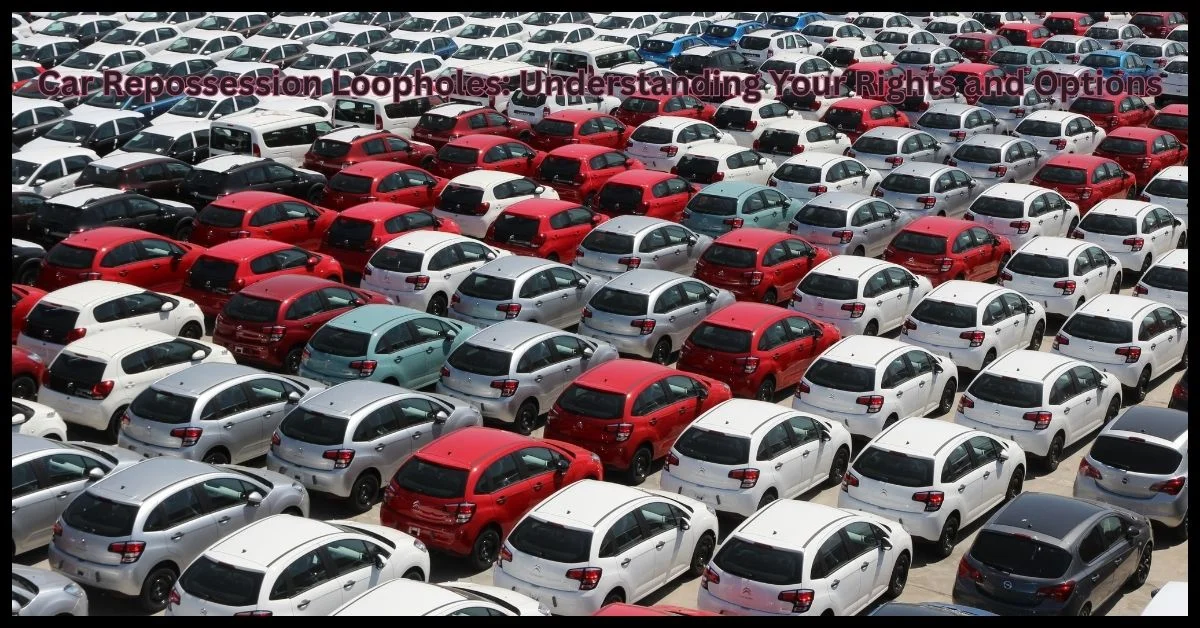Car repossession loopholes refer to legal nuances and strategies that may help borrowers delay or avoid the repossession of their vehicles.Car repossession is one of the most stressful experiences for any car owner who is struggling with financial difficulties. When you fall behind on car payments, the lender has the legal right to repossess your vehicle. This action can cause significant disruption to your life, impact your credit score, and leave you with limited options for regaining your vehicle or avoiding such a situation in the future. However, there are some strategies and loopholes that may provide temporary relief or solutions to help you in the process of dealing with car repossession.
This article will explore various aspects of Car repossession loopholes, including the statute of limitations on repossession, financial assistance options, and strategies to potentially avoid or delay the process. Additionally, we will examine car repossession laws by state and explore the most common loopholes in states like California, Georgia, and other regions. We will also answer frequently asked questions (FAQs) related to car repossession to help you navigate these challenging situations.
What is Car Repossession?
Car repossession occurs when a borrower fails to meet the terms of their car loan or lease, typically due to missed or overdue payments. When the borrower cannot meet the required obligations, the lender has the legal right to reclaim the vehicle as collateral. Repossession can occur without warning, often within a few months of missed payments.
The process can vary by state, but generally, the lender sends a notice of default to inform the borrower that their account is delinquent. If the borrower does not make arrangements to pay off the debt, the lender may contract a repossession agent to recover the vehicle.
Repossession typically occurs in two phases:
- Repossession – The vehicle is taken from the borrower by the lender or an agent working on their behalf. It is usually done without the need for a court order, though some states may require one.
- Sale of the Vehicle – The lender will then sell the car to recover the remaining loan balance. If the sale price is less than what is owed, the borrower may be required to pay the remaining balance (this is called a “deficiency balance”).
Repossession is not only disruptive but also damages your credit score, which can make it difficult for you to obtain loans or financing in the future.
Understanding Car Repossession Loopholes
Despite the seemingly strict nature of repossession laws, there are loopholes and methods that may help you avoid, delay, or mitigate the consequences of a car repossession. These car repossession loopholes primarily focus on your legal rights and the lender’s obligations.
1. Financial Assistance for Car Repossession
If you are struggling financially and fear repossession, seeking financial assistance can help prevent the process. Some options to explore include:
- Negotiating with the Lender: Many lenders will work with you to come up with a payment plan or deferment to avoid repossession. If you explain your financial hardship, they may be willing to extend the terms of your loan or reduce your monthly payments.
- Refinancing: Refinancing your loan can lower your monthly payment by extending the loan term or reducing the interest rate. This may make it easier for you to keep up with payments and avoid repossession.
- Personal Loans: In some cases, borrowing money from a family member, friend, or a personal loan provider can help pay off a part of the loan to bring it current. By paying off some of the debt, you may avoid repossession.

2. Statute of Limitations on Car Repossession
Each state has a statute of limitations that defines how long the lender can legally wait before initiating repossession. The statute of limitations for car repossession can vary based on your state’s laws, but generally, the lender has a set period (usually between 2 to 6 years) from the time of the default to initiate repossession or file a lawsuit for a deficiency balance.
Once the statute of limitations has expired, you cannot be sued for the deficiency balance. However, repossession may still occur, so it’s important to seek advice and act quickly if you are close to the statute’s expiration.
3. Trade-In Car to Avoid Repossession
If you’re unable to keep up with your car payments, trading in your car may be an option. Trading in your car allows you to use its current value toward the purchase of a new or used vehicle. This process can help reduce the outstanding loan balance and, in some cases, allow you to avoid repossession.
When considering a trade-in, ensure the value of the car is sufficient to cover the remaining loan balance. You may also need to work with the dealership to ensure that the trade-in process does not trigger additional complications.
4. Car Repossession Loopholes on Reddit
Online forums, such as Reddit, have become a popular place for people to share advice on Car repossession loopholes and discuss various strategies for dealing with repossession. Many individuals share their experiences, providing valuable insight into potential loopholes, such as:
- Delaying Repossession: Some borrowers may share stories of how they were able to delay repossession by negotiating with the lender or finding technicalities within their state’s repossession laws.
- Reclaiming Property: In some instances, borrowers may find that certain procedural mistakes made by the lender or repossession agent may give them grounds to reclaim their vehicle or cancel the repossession.
5. Car Repossession Rights
As a borrower, you have specific rights during the repossession process. Some of the key rights include:
- Right to Notice: In some states, the lender is required to notify you before initiating repossession, though this requirement is not universal.
- Right to Cure the Default: Many states allow borrowers to cure the default by paying the overdue amount and avoiding repossession. The lender may not repossess the car if you can bring your loan up to date before the vehicle is seized.
- Right to Recover Personal Property: If your car is repossessed, you have the right to recover any personal property inside the vehicle. This includes items such as clothing, electronics, or documents.
6. Car Repossession Loopholes in California
California has some of the most consumer-friendly repossession laws in the country. There are several car repossession loopholes that may apply in California:
- Notice of Default Requirement: In California, lenders must provide borrowers with a notice of default before initiating repossession. This gives the borrower a chance to make payments and avoid repossession.
- Repossessor’s Access to the Vehicle: California law requires that repossession agents cannot “breach the peace” while repossessing a vehicle. If they force entry into a garage or use physical force, they could be in violation of state law.
- Right to Cure: California law gives borrowers a short window to cure the default before repossession can occur.
7. How to Stop a Repo in Progress
If your car is being repossessed, it’s not too late to take action. Here are some strategies for stopping a repossession in progress:
- Negotiate with the Lender: If you’re able to make payment arrangements, the lender may be willing to halt the repossession process temporarily.
- Request a Voluntary Surrender: If repossession is unavoidable, you may be able to voluntarily surrender the vehicle to the lender to avoid damage to your credit score.
- File for Bankruptcy: Filing for bankruptcy can temporarily halt the repossession process due to an automatic stay placed on your accounts. However, this should be considered as a last resort due to the long-term consequences of bankruptcy.
8. Car Repossession Loopholes in Georgia
Georgia is another state where specific car repossession loopholes apply. In Georgia:
- Right to Cure: Similar to California, Georgia law provides the borrower the opportunity to cure the default before repossession is initiated.
- Notice Requirements: While lenders are not always required to provide a notice of default in Georgia, they must provide certain disclosures regarding the repossession process.
- Deficiency Balance: Georgia allows lenders to pursue the deficiency balance after a repossession sale, so it’s important to avoid the repossession process if possible.
Conclusion
Car repossession can be a daunting experience, but understanding your rights and exploring loopholes in the law can help you manage the situation effectively. By negotiating with your lender, exploring financial assistance options, or considering alternatives like refinancing or trading in your car, you can avoid or delay the repossession process. Stay informed about the laws in your state and take action before the situation escalates.
FAQs about Car Repossession Loopholes
1. How can I stop my car from being repossessed?
You can stop a repossession by negotiating with the lender for a payment plan, refinancing the loan, trading in the car, or filing for bankruptcy. You may also have the right to “cure” the default if you are given notice.
2. What are my rights during car repossession?
Your rights during repossession include the right to receive notice, the right to recover personal property from the vehicle, and the right to cure the default before repossession.
3. How does car repossession affect my credit?
Car repossession significantly damages your credit score, making it difficult to obtain future loans or financing. The impact can last for several years.
4. Can I get financial assistance for car repossession?
Yes, you may be able to seek financial assistance through loan deferment, refinancing, or personal loans to help bring your car payments up to date.
5. What is the statute of limitations on car repossession?
The statute of limitations on car repossession varies by state but generally ranges from 2 to 6 years from the date of default.
6. Are there any car repossession loopholes in Georgia?
Yes, Georgia has several car repossession loopholes, such as the right to cure the default and requirements regarding notices and deficiency balances.











